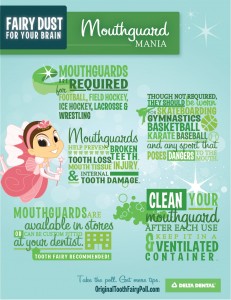Mouthguard Mania
By Jill Feilmeier on August 1, 2013 in Kid's Health

When you are out school supply shopping, don't forget to include mouthguards on your list for fall sports. And although mouthguards may not be mandatory for all sports, Delta Dental of Iowa recommends they be worn for all athletic activities with potential for dental injury.
Many studies have shown that young athletes who wear mouthguards suffer far fewer dental injuries than those who don't. Just because a sport doesn't require a mouthguard, doesn't mean children are safe from harmful injuries to the jaw, mouth and neck.
Mouthguards are not required for soccer, but studies show that soccer players are more likely to sustain a dental injury than football or hockey players, sports where mouthguards are mandatory.
Even sports with no inherent player contact, like biking and gymnastics, introduce the risk of injury from falls and mouth clenching. The solution is to wear an athletic mouthguard. Before high school football players were required to wear mouthguards and facemasks, 50% of players' injuries were oral-facial. Now they represent less than 1% of injuries.
Although mouthguards reduce the risk of dental injury, only 28% of children playing soccer actually wear them at practice and games, according to the 2013 Delta Dental Children's Oral Health Survey. Most organized sports-related injuries actually occur during practice rather than games. But according to the Delta Dental survey, many children wear mouthguards just at games and not at practice.
There are three types of mouthguards currently available:
• Stock mouthguards are relatively inexpensive and have a pre-formed shape. But since the fit can't be adjusted, they're less effective than a fitted option. And, sometimes they don't stay in place, which may cause impediments in breathing and speech.
• Mouth-formed mouthguards can be purchased at many sporting goods stores and can be molded to the individual's mouth, usually by boiling the mouthguard in hot water to soften the plastic.
• Custom-made mouthguards are considered the best option. Since your dentist makes them from a mold of your teeth, they fit tightly and correctly. Although a custom mouthguard is the most expensive option available, it's a solid investment when compared with the thousands of dollars in dental work it can take to replace a lost tooth.
Still, if cost is a consideration, any mouthguard is better than none at all. For more information on mouthguards and protecting your child's smile, click here.
Click image to enlarge.